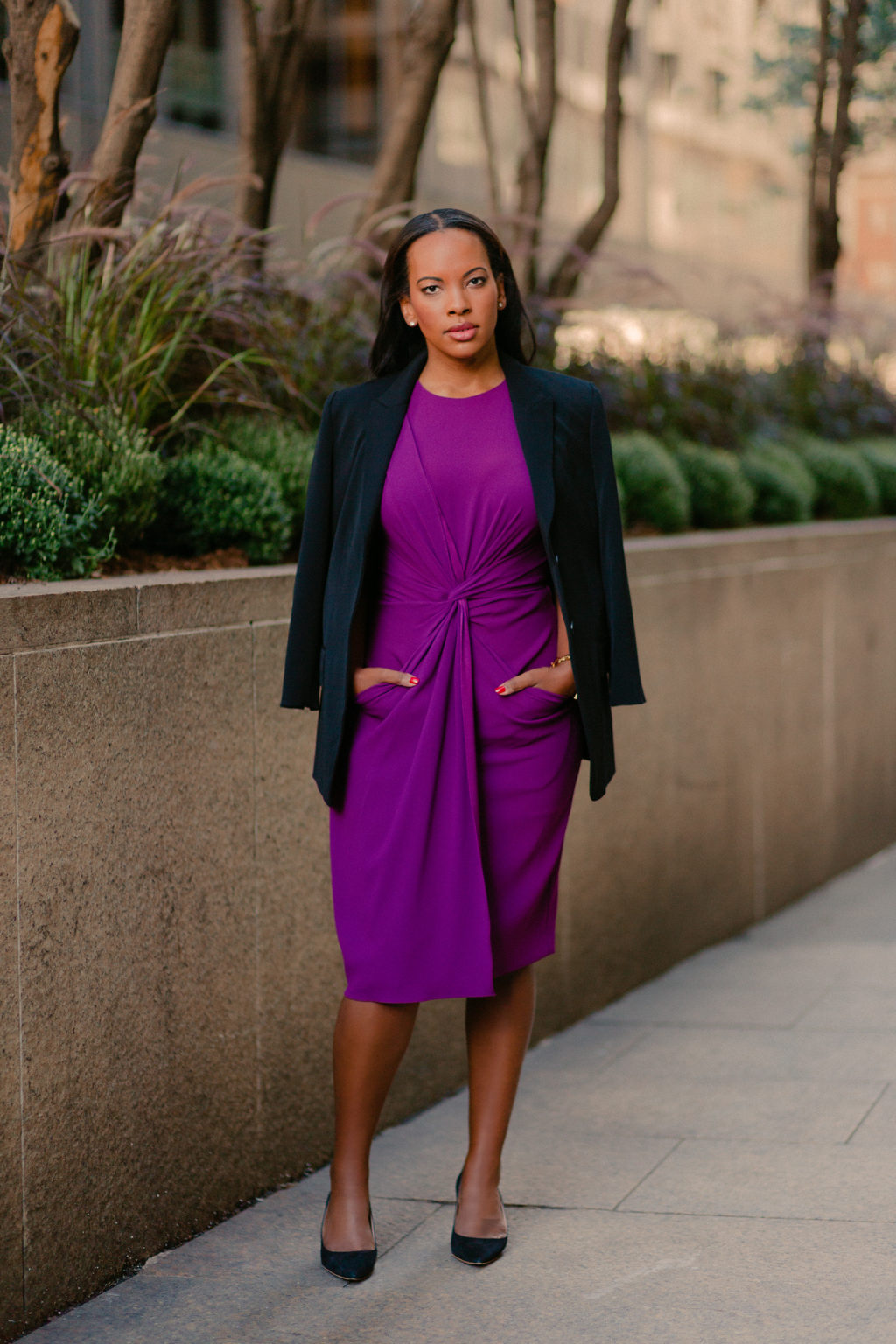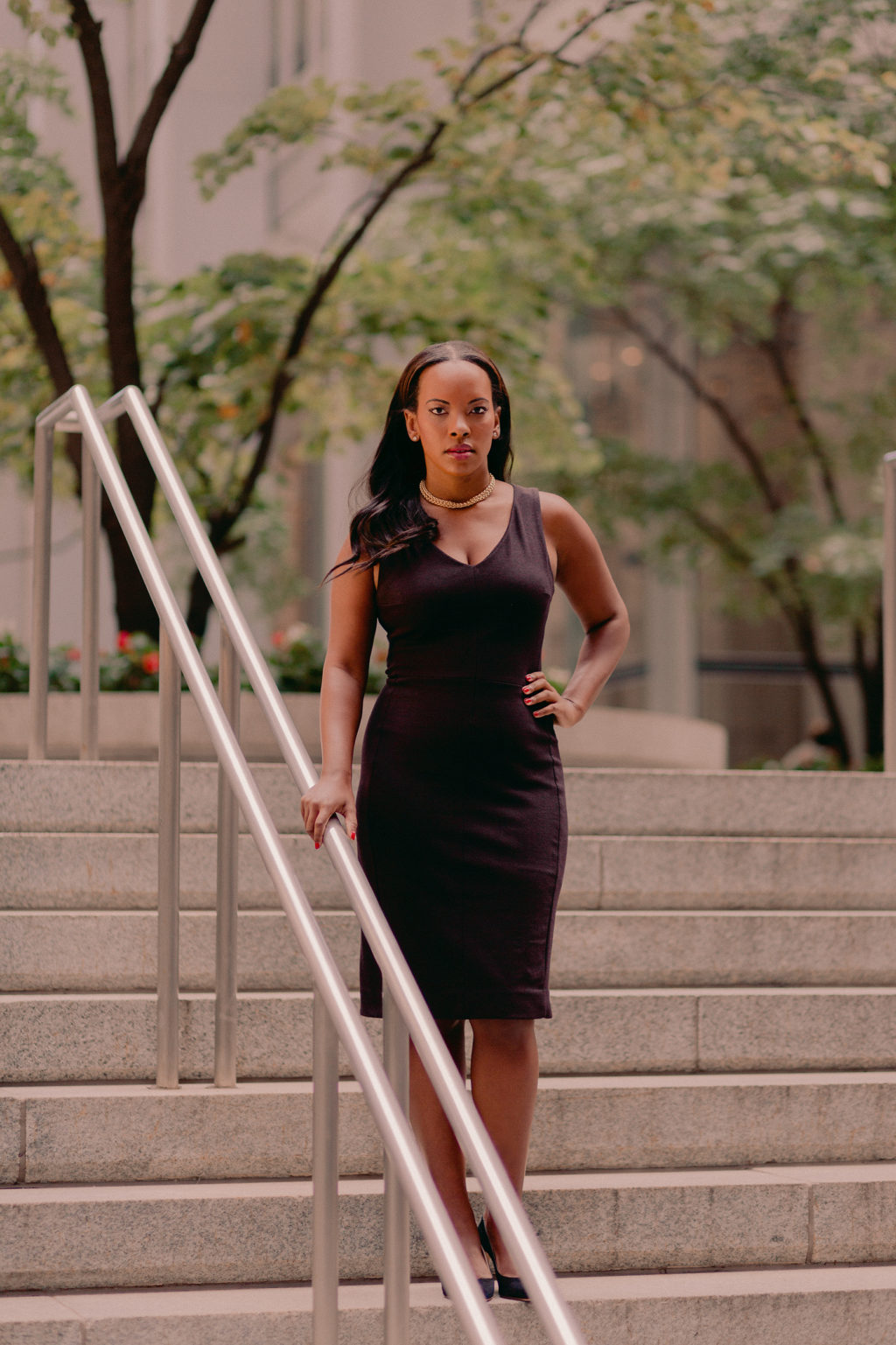Venture Capitalist Sarah Kunst Wants to Give Women Money
October 26, 2018 | Filed in: Woman of the Week
Last February, Sarah Kunst launched her own VC firm, Cleo Capital, with the mission of funding female-owned businesses—welcome news in a world where female founders secured only 2 percent (!) of VC dollars in 2017. She’s also a senior advisor at Bumble, the dating and networking app, where she is helping to oversee Bumble Fund, another female-focused investment vehicle. Here, she shares tips on asking for favors, breaking into the VC world, and traveling nonstop—plus, why you’ll never find her grocery shopping on a Saturday.

Sarah wears the Maite dress and the Parks coat.
I’VE ALWAYS HAD A GOOD STRATEGIC MIND, and I knew I wanted to go into business since I was a kid. My dad ran a small insurance agency, so I was exposed to certain aspects of running a business as I was growing up. I was also encouraged to manage my own finances and save money. Starting around ten or twelve, I got an allowance to buy almost everything but food—shampoo and conditioner and other basics. So I learned early that you don’t just buy Redken because that’s what your mom uses. When you have twenty dollars to spend on shampoo and conditioner, you want to do some research and buy something that takes your dollar further. And if I wanted more money, I needed to make it myself. I’m from a small town in Michigan, so the first job I ever had was on a farm. I picked strawberries one summer, and the next summer I pulled weeds in a bean field.
I MAJORED IN ADVERTISING AT MICHIGAN STATE, but most of what I learned in college was outside of the classroom. I think college is an interesting petri dish where you can explore different things at a relatively low risk. For example, I was my sorority’s philanthropy chair, so I learned about nonprofits and budgets and what a good ROI looks like from doing that. I was also a campus representative for a couple of big brands, like Apple, and that taught me about how marketing works and how to connect to customers, especially millennials, who have different priorities and career trajectories than those of previous generations.
WHEN YOU’RE NOT AT A TOP UNIVERSITY, you need to have a specific plan if you want to get a job in a place like New York, which was where I wanted to be. I started interning in New York when I was in college, and I didn’t just show up to the office and call it good. I was very intentional about building a network and staying in touch with people. I wanted to work in fashion, media, or advertising, so I spent a lot of time researching those industries and reading publications like New York Magazine and Gawker so that when I moved to New York it wasn’t like I fell off a turnip truck. I prepared myself.

Sarah wears the Taylor dress and the Carson blazer.
I GOT MY FIRST INTERNSHIP by cold-emailing a bunch of places years in advance. Then I met a girl at that internship who later took a job at Chanel. When I was about to graduate, I told her I was moving to New York, and she said, “Great. Somebody’s hiring here.” So my first job, thirty days after graduating, was at Chanel. The timing was huge, because it was the summer of 2008. A lot of my friends graduated and said, “Hey, I’ll get a job this fall.” By then, the economy had collapsed. I got ahead of that because A) I knew what I wanted to do, and B) I went and did it instead of waiting and assuming that tomorrow would be just as good as today.
THE WORST THING YOU CAN DO is meet people once and then reach out and ask for a favor. Building a network is lot like dating. If you match with a guy on a dating app and you show up to meet him and the first thing he says is, “Hey, I forgot my wallet. Can you buy me a beer and pay for my cab home?” That’s not a great experience. The same is true for networking. You need to spend time with people and get to know them. If somebody doesn’t share your interests, or you can’t get on the same page with them, then they probably aren’t going to be a great resource for you. You want to find people you align with, and who are also somewhat related to your goals.
I THINK OF MY NETWORK AS BEING LIKE A SPORTS TEAM, and building a winning team takes a while. Sometimes people get drafted away to other teams: they move or they switch careers or you have a falling out. But now that I’ve been out of school for ten years, a lot of the people I do business with, am friends with, and get stuff done with are people I’ve known for most of the past decade.

Sarah wears the Rachel dress and the Valentina necklace.
WHEN PEOPLE ASK ME FOR INTRODUCTIONS, I always ask why. A lot of people want to be introduced to some big-name person, but it turns out that what they want is something that big-name person could not help them with. For instance, if you have a great idea for Microsoft, talking to Bill Gates or Satya Nadella will probably get you nowhere. You should actually talk to a product manager. Those are usually worthwhile intros. But if you just want to be able to say you met that big-name person, then you should do what everybody else does and buy a ticket to a conference and ask that person a question, and then get a picture with them afterward.
WHEN YOU’RE ASKING FOR A FAVOR, you need to know exactly what it is and why you’re asking that specific person. It also needs to be something that person can help with and that isn’t a crazy amount of work. You can’t go up to Gisele Bundchen and say, “Gisele, will you be my egg donor because I want a supermodel baby?” That’s an inappropriate ask, even if you can get in front of her. But if you contact her and say, “Gisele, I’m a young Brazilian-American entrepreneur and I have a new skincare line. I know you’ve talked a lot about eczema and you want healthier solutions. Here’s a sample. My business card is on it. If you like it, please email me”—that might get you somewhere.
WHENEVER I GET INTERESTED IN SOMETHING NEW, I just start reading about it. I may not understand everything perfectly, but after a while, information starts to sink in. With the advent of social media and podcasts, there’s no excuse for not being able to teach yourself a ton about any topic under the sun. If you want to work in the venture field, google venture capitalists, find a list of names, follow them on social media, and listen to every podcast and watch every YouTube video where they’ve been interviewed. If you do that for just a few hours, you’re going to know a decent amount. And if you do it every weekend for five hours, you’re going to know even more.

Sarah wears the Maite dress and the Parks coat.
A LOT OF PEOPLE THINK THEY’LL JUST GET PAID what they deserve. But as a woman, and especially as a woman of color, I know that may not happen for me, and I need to negotiate. When I was interning one summer, I sat next to another intern who was an economics major at one of the best universities in the world. At one point, we started talking about salaries, and it turned out that I was making two dollars an hour more than she was. When I was offered the internship, they told me the salary range was $15 to $19 an hour, so I asked for $19 and they gave me $17. And the other intern said, “Oh, they told me the salary range, but I didn’t ask for anything and they just gave me $15.” I said, “Why didn’t you negotiate?” And she said, “I haven’t taken a negotiation class yet.” She was probably smarter than me, she definitely went to a better school and was getting a better degree, but she was making less money than me just because she was afraid to ask.
WHEN IT COMES TO NEGOTIATING FULL-TIME SALARIES, women tend to not ask and, even worse, to get penalized if they do. So you have to think about timing and circumstances. In the case of that summer internship, I had already gotten the offer, and I knew they weren’t going to rescind it or fire me because I asked about the salary range. I also wasn’t going to be there for longer than one summer, so I wasn’t as worried about any long-term effects. I think that if you can train yourself to negotiate in low-risk situations, you’ll get more comfortable in higher-risk ones.
MY TRANSITION TO THE VENTURE WORLD WAS pretty organic. When I was still working in business development, I found I was also helping startups on the side all the time. I would sit down at a dinner or go to a birthday party or be at a brunch, and somebody would start telling me about their company and I’d say, “Have you thought of this? Have you done this? Have you looked at this?” And then that person would say, “Can you help me? Can you come in for a lunch with my team? Can I introduce you to more people? Can I take notes?” After this happened a few times, an investor called me because she had been talking to people at some of the same companies that I’d helped, and they’d told her about me. She offered me a job, and I said yes. And that’s what tipped me over from the business development world into investing in and helping to build companies.

Sarah wears the Taylor dress and the Christa bracelet.
A PERFECT WORK-LIFE BALANCE is a fantasy, in my opinion. Personally, I think the best way to feel like you have a life, even when you work a ton, is to find time to do what you want to do when you want to do it. I will candidly that admit I’m very excited to be married and have kids someday, but for now, I don’t have to consider anyone else’s needs except my own, and I have more freedom because of that. I can also organize my own time during the week, so I take advantage of that flexibility. You will never find me going to the gym or buying groceries on Saturday at 10:00 A.M. when everyone else is doing it—that’s usually when I’m at home catching up on work. But come Monday at 10 A.M., unless there’s a call or meeting I couldn’t get out of, I’m probably at the gym and getting groceries because it’s much more enjoyable to do it then. Obviously, a lot of people don’t have that kind of control over their schedules, but most people have some flexibility—the question is, how do you dig into that and carve out time for the things you really care about?
I TRAVEL A LOT, and my best tip is to always use the same airlines and hotel chains, even if it costs a little bit more. When you’re so tired from dealing with unfamiliar places, it gets stressful. But when you know you’re flying Delta and you’ll get those little Biscoff cookies, or if you know that Marriott hotels always smell a certain way or have the bath products you like, it adds predictability and comfort. You may be sleeping in a different city every night, but at least you’re sleeping with the same foot lotion, and that makes it all feel a bit more manageable.
IT’S ALSO OKAY TO NOT CARE about certain things that other people care about. For example, I do not care about having a formal office space, so I work from wherever. But if you are more productive and happy when you have a dedicated place to go and work, then by all means, prioritize that. Everybody has their own best practices—don’t apologize for them.

Sarah wears the Rachel dress and the Valentina necklace.
Photographs by Bridget Badore. Styled by Nyjerah Cunningham.





